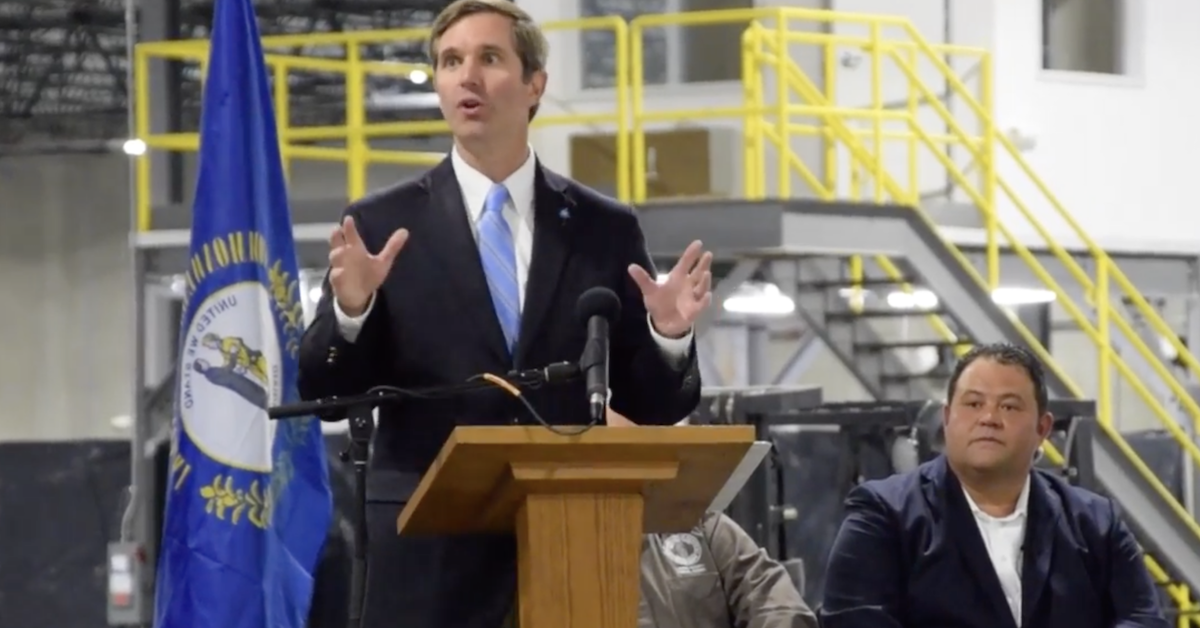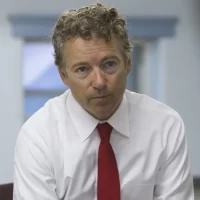FRANKFORT, Ky. — London Mayor Randall Weddle says he told a fundraiser for Gov. Andy Beshear’s reelection in late 2022 that he planned to make political contributions of others on his credit card, but instead of being warned that such a move would be illegal, the fundraiser told Weddle, “Okay sounds great.”
Weddle also said that he learned days later from a friend that making such contributions was prohibited and repeatedly asked the same fundraiser to fix the situation and refund the illegal excess contributions made on the Weddle credit card, but no action was taken.

It wasn’t until April 17 — the day the Kentucky Lantern published a story raising questions about the massive bundles of contributions from Weddle’s family, employees and business associates to the Beshear campaign and Kentucky Democratic Party — that Weddle says he took the matter directly to Beshear and a process began that led to the campaign and party refunding $202,000 in excess contributions made on Weddle’s credit card.
Those are key points made by attorneys for Weddle on Monday in a written response to a complaint filed against Weddle last fall by the Kentucky Registry of Election Finance for alleged violations of state laws that prohibit a person from making a campaign contribution in the name of another.
Weddle’s response, written by his lawyers Douglas McSwain and Guthrie True, concludes, “Mr. Weddle’s actions demonstrate he had no improper intent or knowledge associated with the contributions, and indeed, he even requested corrective action be taken to reverse the incorrect contributions charged to his credit card …”
Weddle’s response points the finger at someone it describes as “a fundraiser” for Beshear and the Democratic Party named Lucas Johnson.
It is Johnson, the Weddle response says, who OK’d Weddle’s initial suggestion that he make two excess contributions on his credit card, and Johnson who appeared to take no action in response to Weddle’s later pleas to fix the situation and refund the excess contributions.
“It is clear to Mr. Weddle,” the response also says, “that the governor knew nothing about the contributions mishap.”
Weddle’s account disputed by Beshear camp
Besher’s campaign manager Eric Hyers on Tuesday disputed Weddle’s account of what happened. “Despite any new assertions to the contrary, the campaign and party first learned about the issue in late April 2023 and reached out to KREF to self-report the matter the same month,” Hyers said in a statement. “The campaign and party worked closely with KREF to refund the contributions and reflect the refunds on their filings.”
Hyers said that a lawyer who initially represented Weddle on this matter, McKinnley Morgan, reviewed and approved the Democratic Party and Beshear campaign letters sent to KREF in early May reporting the problem.
Johnson did not respond to a message left with him at Kentucky Democratic Party headquarters.
State and federal law strictly limit how much any individual can contribute to a campaign for governor or to the executive committee of a political party. In 2022 state law set the limit for an individual’s contribution to a governor’s campaign at $2,000 per election. That limit was raised in 2023 to $2,100. The maximum a person can give to a political party is $15,000 a year.
The Kentucky Registry of Election Finance, or KREF, is investigating whether Weddle exceeded those limits by violating the state law that bans a person from giving, loaning or advancing money to other people — known as straw donors — whose names are falsely listed in disclosure reports as the donors.
Kentucky Lantern’s April 17 report was the result of its analysis of thousands of donations reported by the Beshear reelection campaign and Kentucky Democratic Party. The story concluded that Weddle’s family and friends constituted the group giving the most to help Beshear win reelection — at least $305,500. The Lantern reported that none of the 19 people who combined to give this large amount had ever before made a large political contribution.
Beshear and his campaign manager declined to be interviewed for that story. Four days after the report Beshear did not answer a question from a Lantern reporter about how the Weddle group’s contributions came about, saying only that all contributions to his campaign are “voluntary.”
But in June, Hyers, Beshear’s campaign manager, disclosed that shortly after the Lantern report Weddle had come forward to tell the campaign about contributions made on his credit card but listed as contributions of others in reports the campaign and party had filed with KREF and the Federal Election Commission. Hyers said that those excess contributions — totaling $202,000 — had been refunded to Weddle’s credit card.
‘You’re the man’
Weddle’s seven-page response is his first public explanation as to how the controversial contributions came about. It conflicts sharply with what he told the Lantern early this year in telephone interviews when he said he had no idea how all of his immediate relatives and many friends came to give $15,000 to the Democratic Party and $2,000 to the Beshear campaign at about the same time.
Weddle’s lawyers say the response is the product of their “considerable investigation of the facts.” The Weddle lawyers acknowledge “that some participants to the events may have differing recollections of the events and conversations.” The response is based largely on text messages between Weddle and the fundraiser Lucas Johnson.
While Johnson was raising money for both the Beshear campaign and the Kentucky Democratic Party (KDP) in December of 2022, he was working hard to raise money for the party so it could post a big total by its filing deadline of Dec. 31. The texts also indicate Weddle was eager to help, even though he was on a family vacation in the Bahamas.
A long series of texts between the two begins early on Dec. 27 after Weddle transmitted contributions of $2,000 to the Beshear campaign, each from his wife and two children. But Johnson replied that those three family members had already given the maximum to the Beshear campaign and that money would have to be refunded. “It’s the KDP we need before the end of the year,” Johnson texted Weddle.
The two exchange at least another 24 texts during that day, as both worked out technical problems in transferring contributions to the party’s account. But the texts indicate both were pleased that the Democratic Party would be getting a windfall before the end of the year.
“Thank you for your support,” Johnson said in a text. “You’re the man!”
Weddle later wrote, “I have more coming we should be able to hit $250k or 300k by the 31st.”
Weddle’s response says that the key text in this exchange was one in which Weddle says for just two of the contributions — those from his mother and mother-in-law — “I’ll have to use my credit card they’ll have to give it back to me.” Johnson replied, “Okay sounds good.”
State of mind
Weddle’s attorneys argue that it was “significant to Mr. Weddle’s state of mind” that “Johnson never advised Mr. Weddle that this method of contributing was not permitted.”
The response further also lists a flurry of texts exchanged between Weddle and Johnson on the night of Dec. 30 in which Weddle informs Johnson of a dozen additional contributions that were being made to the party and Beshear campaign.
“I’ve got you 219k this week,” Weddle texted Johnson.
“Haha it’s a usual thing in fundraising! Yessir you have!” Johnson replied.
But the Weddle response says that the following day in a conversation with friends about the contributions, one friend told Weddle that the law did not allow him to put the contributions of others on his credit card. In phone calls the following week, Weddle told Johnson of the problem and directed him “to promptly ‘fix’ this situation and reverse the contributions,” the Weddle response states.
Weddle, according to the response, continued to ask Johnson in the following weeks and months to “get the incorrect credit card contributions reversed and refunded.”
On March 9, Johnson warned Weddle in a text that the party had gotten a phone call from a reporter and suggested, “We probably need to hop on the phone at some point tomorrow to make sure we are all on the same page.”
The response says Johnson and Weddle talked by phone later that day and five more times in late March but still “the problem of the contributions is not resolved.”
Finally, the day the Lantern published its story, April 17, the response says, Weddle contacted “an individual known to be close to the Governor” to help arrange a meeting with Beshear.
Weddle, Johnson and the person known to be close to the governor, who is not identified in the response, met on April 21. “Mr. Weddle informed those present of the issue with the contributions having been made through his credit card.”
As a result of the meeting, the Beshear campaign and Democratic Party reported the matter to KREF, apparently by phone on May 2, the response states.
KREF is conducting a regulatory civil investigation of the matter which can ultimately result in a fine of $500 per violation of campaign finance laws. If it finds intentional violations of the law, it can refer the matter to the Kentucky Attorney General Russell Coleman or a local prosecutor for a criminal investigation.
But Weddle’s lawyers say in their response that Weddle’s attempts to correct a mistake show “there is no reasonable basis or ‘probable cause’ to believe that Mr. Weddle committed any intentional or knowing violation” of law.
KREF will continue its investigation, a process that could involve interviewing witnesses and subpoenaing records.
This article is republished under a Creative Commons license from Kentucky Lantern, which is part of States Newsroom, a network of news bureaus supported by grants and a coalition of donors as a 501c(3) public charity. Kentucky Lantern maintains editorial independence. Contact Editor Jamie Lucke for questions: info@kentuckylantern.com. Follow Kentucky Lantern on Facebook and Twitter.
Tom Loftus is a native of Cincinnati and a graduate of The Ohio State University. His long career in Kentucky journalism includes four years as Frankfort bureau chief for The Kentucky Post and 32 years as Frankfort bureau chief for The Courier Journal. He is a member of the Kentucky Journalism Hall of Fame and a freelance reporter for the Kentucky Lantern.






